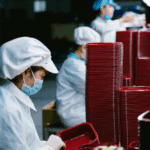FACTORY WORKER JOBS IN NORTH KOREA 2023
In April, limited maritime trade with China resumed. The country has approximately 4,000-5,000 clam and flower crab farms. These farms have been idle since last year due to international nuclear sanctions and the coronavirus pandemic.
Child labor
Child labor is a serious issue in North Korea, but its effects have been largely concealed. According to the UNHCR, North Korea engages in some of the most horrifying forms of child labor. For example, the country uses children as sex slaves and bodyguards in armed conflict, and they work with dangerous equipment in quarries and farming. There are also numerous reports of ‘child re-education through labor’, a practice in which children are forced to complete unpaid tasks. Despite the North Korean government’s official ban on underage work, it is not uncommon to see schoolchildren working in factories and farms.
The UN estimates that over 50,000 North Koreans work abroad, earning the country between $1.2 billion and $2.3 billion a year. But some experts question the UN’s claims. Some North Koreans work in China and Russia, but many are also working in Africa and in the Middle East on construction sites. The higher wages in EU countries make them a logical destination for North Korean workers.
Child labor risks have risen globally, particularly in countries with large supply chains. A recent Maplecroft report found that child labor risks increased by 10% in the year to 2012. This report also found that 76 out of 197 countries studied had a high level of child labor risk. The United States was ranked 141 in the list, alongside nations such as Kuwait, Cuba, and Georgia.
Government-salaried jobs
In North Korea, factory worker jobs are mostly under the government’s supervision, and they pay well. Factory workers are provided with rations and raw materials from the government. In some cases, workers are even given access to stolen products. However, despite the high wages, the workers are often unable to return to their factory jobs. Consequently, some workers are forced to take other jobs to survive.
In the North Korean economy, millions of men work on official jobs. Unfortunately, most of these jobs do not pay enough to support a family. The average official salary in the DPRK is around 5,000 to 10,000 won a month, equivalent to approximately $1 to $3 on the black market. The average worker can only afford a few kilograms of rice or corn per month.
While the minimum wage is expected to increase in North Korea by 5% by 2022, it is currently less than a dollar per hour. This does not account for bonuses, paid leave, health insurance, transportation allowances, or other benefits. However, the salaries of factory workers will continue to rise.
Remittance of 80 percent of wages to the government
Since the North Korean government started remitting 80 percent of wages to the government for factory jobs in the mid-2000s, they have made considerable progress towards the goal of eliminating foreign worker dependency. This is especially true in the small and medium-sized enterprises, where foreign workers have begun to replace local Koreans. This may also result in jobs being taken from native-born women and the elderly. In 2009, the government attempted to impose an employment levy on employers who hired foreign workers, but business opposition prevented it from taking effect. Now, however, they are considering a levy on workplaces that employ more than five or ten foreign workers.
The famine of the 1990s paralyzed North Korean economic institutions. It has since pursued a policy of Songun, which involves using the military to control industrial development and infrastructure projects. As a result, the North Korean economy has become increasingly isolated from the rest of the world. Because the country is isolated and unable to compete on the international stage, its industrial development has been inefficient and stagnant. Moreover, the government’s protectionism limits the market size for North Korean producers and does not enable them to benefit from economies of scale.
High turnover of staff
The regime is trying to create a more prosperous, market-oriented society, but the country’s economic system is not as robust as it could be. A recent report by the U.S.-based NGO Open Doors ranked North Korea as the worst country for persecution of Christians in 2020. The country has consistently been ranked at the bottom of the list since the establishment of Kim Jong-un in 2006.
The political system in North Korea is highly segmented, and there is no rule of law or guarantee of property rights. Corruption is rampant, and the regime is using its expanding market to guarantee the privileges of loyal groups. Corrupt activity plays a double role, supporting illegal commercial activities and redistributing profits to regime-friendly entities.
| NORTH KOREA Jobs | Apply Now |
Occupational hazards
In the mid-1980s, North Korea began to change its repressive, self-reliant policies. Known as the open-door policy, the new policies included an increased emphasis on foreign trade, the acceptance of direct foreign investment, and the opening of the country to international tourism. The country also decided to work more closely with South Korea to promote economic co-operation.
Occupational hazard responsibilities of a child worker
In North Korea, children are often employed in factory worker jobs. These children have a high risk of workplace accidents because their bodies are growing and they are less likely to have the proper safety training and protections. Furthermore, they are more likely to imitate the unsafe behaviors of adults. As a result, they are at greater risk of serious injuries or even death than adult workers. In addition, child workers often face severe exploitation because they lack appropriate training and protection.
Some countries have tried action-oriented participatory approaches to improve workplace safety in their workplaces, such as in Thailand. These programs engage community members in the identification of workplace hazards and help them implement low-cost improvement measures. The resulting programs also promote ownership and sustainability.
The extent of risk exposure varies depending on the nature of the job. The level of risk may be low, moderate, or high, and the number of workers affected by the conditions varies. Nonetheless, all jobs carry some degree of risk. Occupational injury rates are increasing in low-income and middle-income countries, while they are falling in high-income countries. This trend is mainly attributed to the export of labor-intensive and dangerous industrial production to regions with lower salaries and less regulated workplaces. Furthermore, the number of small businesses has increased, resulting in poorer working conditions.
| NORTH KOREA Jobs | Apply Now |
Cybersecurity measures
The government of North Korea is implementing cybersecurity measures to protect factory workers’ jobs. The goal is to protect the nation’s information systems from cyber attacks, which are a growing threat. The cybersecurity policy will help the country prepare for a cyber attack, as well as respond to one.
The government of North Korea has outlined several priorities to implement its cybersecurity policy. These include improving national cybersecurity policies and developing critical infrastructure protection organizations. The country also has implemented cybersecurity R&D and education programs to develop its cybersecurity workforce. The overall cybersecurity capability of North Korea is assessed based on the level of implementation of cybersecurity policies.
Cyber attacks can occur at any time. However, thorough preparations are made before big events. In 2018, Korea hosted the Winter Games in PyeongChang. A massive cyber attack disrupted information systems related to the Olympics. As a result, most services were interrupted.
IT workers in the DPRK use privileged access they have gained in their contractor roles to support cyber attacks. They are able to gain access to virtual infrastructure that enables the government to conduct cyber activities. This privileged access has led to the sale of stolen data and money laundering.
Additional Benefits & Perks
- Market competitive salary
- accommodation/transportation
- Family medical insurance
- Annual leave or vacation
Applying Link
| NORTH KOREA Jobs | Apply Now |









